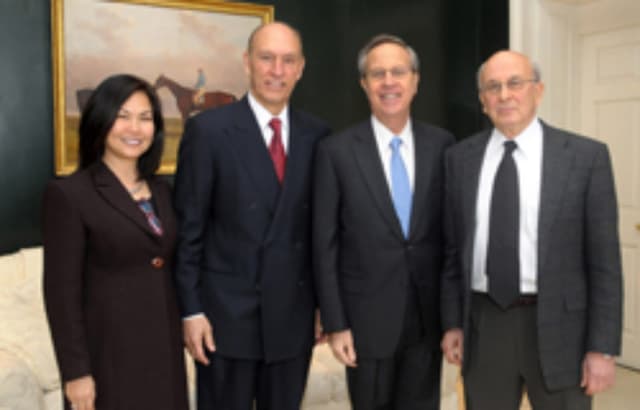Kavli Institute for Neuroscience at Yale Receives Additional Endowment Funds

(Originally published by Yale University)
February 21, 2011
Building upon a grant made in 2003 that established the Kavli Institute for Neuroscience at Yale, The Kavli Foundation has announced that it will contribute additional endowment funds to diversify and strengthen the institute’s interdisciplinary brain research.

Yale researchers have excelled in the quest to understand the fundamental mechanisms of how the human brain develops and functions. Findings from basic neuroscience may have profound implications for understanding brain disorders such as autism, schizophrenia, mental retardation, dyslexia, and neurodegenerative diseases.
Under the direction of Pasko Rakic, M.D. Ph.D., Kavli Institute scientists since the institute’s opening in 2005 have conducted influential research on the molecular, cellular and functional organization of the cerebral cortex, the part of the brain responsible for higher brain functions such as language and reasoning.
The new commitment will enable the Kavli Institute to expand its mission to embrace Yale research on the nervous system more broadly, drawing on the expertise of the nearly 100 neuroscientists working in 20 departments across the Yale campus.
“Understanding the human brain is considered the ultimate challenge of science in the 21st century,” said Rakic, chair and the Dorys McConnell Duberg Professor of Neurobiology at Yale School of Medicine. “To achieve this laudable goal we must embrace a multidisciplinary approach, using the most advanced technologies in a variety of experimental model systems. It also requires collaboration and frequent exchange of ideas between scientists of different backgrounds. All of these will be cultivated at the Kavli Institute.”
To realize this wider vision, the institute’s Steering Committee will set the institute’s research agenda, foster scientific collaborations at Yale, and build ties with researchers at Kavli Institutes elsewhere. The disciplines expected to contribute to the Yale Kavli Institute’s research range from genetics to psychology. The institute will foster the development of novel concepts and technologies to investigate the functional properties of the living brain.
In addition to providing research support, the new funds will provide support to top Yale graduate students in neuroscience, who will be designated as Kavli Scholars.
“We are very excited by the expanded approach to neuroscience research the Kavli Institute for Neuroscience at Yale is undertaking,” said Fred Kavli, founder and chairman of The Kavli Foundation. “Science flourishes with collaboration and this will be a great stimulus to more innovative research.”
Bob Conn, president of the foundation, added, “The foundation is very pleased that Yale will be significantly expanding the scope of activities at the Kavli Institute for Neuroscience. It’s also wonderful that, with the establishment of the Kavli Scholar program, Yale’s top graduate students in neuroscience will have even more reason to be part of this exciting research enterprise.”
Fred Kavli, a Norwegian-born businessman and philanthropist, launched the Oxnard, Calif.-based Kavli Foundation in 2000 to stimulate a broad range of research in astrophysics, neuroscience, and nanoscience; the foundation has since added theoretical physics as an area of interest. To that end, the foundation has established 15 Kavli Institutes at academic institutions around the world. Yale’s Kavli Institute is one of four devoted to neuroscience.
The foundation also endows Kavli Professorships; educational programs, symposia, and awards; and the Kavli Prize, a prestigious biannual $1 million award that recognizes seminal advances in astrophysics, neuroscience, and nanoscience. For his decades of pathbreaking research on the mechanisms of the development of neuronal organization and synaptic circuits of the cerebral cortex, Rakic received the inaugural Kavli Prize in Neuroscience in 2008. James E. Rothman, Ph.D., the Fergus F. Wallace Professor of Biomedical Sciences and chair of the Department of Cell Biology at Yale School of Medicine, was a recipient of the Kavli Prize in 2010 for his discoveries on the molecular mechanisms of synaptic transmission.
“We are very grateful to Fred Kavli for his continued support of the Yale Kavli Institute and our neuroscience programs,” said Robert J. Alpern, M.D., dean of Yale School of Medicine. “This recent gift will allow us to expand the size and scope of the Kavli Institute to provide the means to explore new directions for Yale’s neurosciences.”